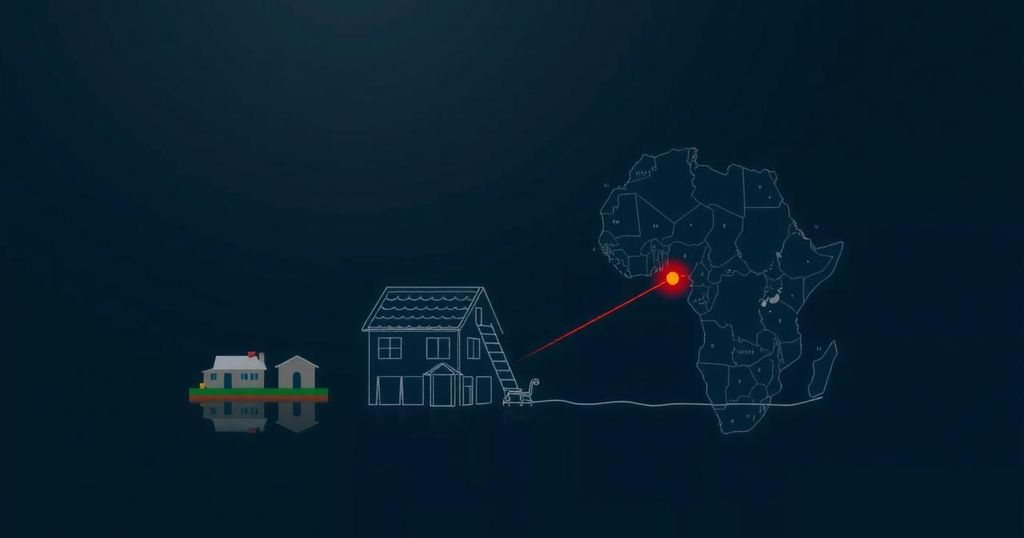Severe Flooding Crisis in Chad, Nigeria, and Cameroon: A Call for Urgent Humanitarian Assistance

The flooding crisis in Chad, Nigeria, and Cameroon has left over 2.7 million people affected, with urgent needs for food, water, and shelter. The crises have caused widespread destruction, overwhelming existing vulnerabilities in food security. Action Against Hunger underscores the necessity for accelerated funding to support emergency responses in the affected areas.
Severe flooding has critically impacted millions across Chad, Nigeria, and Cameroon, overwhelming these nations with unprecedented rainfall. Over 2.7 million individuals are affected, with reports indicating 1.7 million in Chad, one million in Nigeria, and over 230,000 in Cameroon. In Chad, the floods have commenced at the end of July and continue to wreak havoc through the Lac, Mayo-Kebbi Est, Mandoul, Tandjilé, and Batah provinces, even reaching the Sila province, which is home to refugees from the ongoing conflict in Sudan. Consequently, the floods have claimed over 500 lives, destroyed more than 210,000 homes, submerged 880,000 acres of agricultural land, and killed nearly 70,000 cattle. This destruction presents a serious hunger crisis in a nation where 3.4 million individuals already face acute food insecurity. The Director of Action Against Hunger in Chad, Gusatve Gnagny, emphasized the critical assistance needed: “The affected populations are facing critical needs for food, drinking water, shelter, health and protection. According to initial estimates, nearly $100 million is needed to bring relief to these stricken populations. So far, barely 10% of this sum has been mobilized.” In Nigeria, flooding has gravely affected regions including Borno, Adamawa, Bauchi, Enugu, Jigawa, Kano, Bayelsa, and Yobe, leaving tens of thousands without shelter or sustenance. Prior to the floods, Nigeria was already grappling with severe food insecurity affecting over 32 million individuals. The capital of Borno state, Maiduguri, was particularly hard-hit, with half of the city submerged, affecting 414,000 residents. Thierno Samba Diallo, Country Director of Action Against Hunger in Nigeria, articulated: “The floods have damaged over 300,000 acres of farmland in Nigeria. The damage is likely to exacerbate food insecurity during the current lean season and in the months to come.” Cameroon faces a similar crisis, with approximately 236,000 individuals impacted in the Far-North region and over 30,000 acres of crops ruined due to the floods. Concerns about waterborne diseases are escalating, as the infrastructure, including bridges and dykes, has suffered considerable damage, resulting in populations likely to be displaced. Pascal Maillard, the Country Director in Cameroon, remarked: “Certain infrastructure such as bridges and dykes have already collapsed, which will generate massive population displacements. The priority needs are food, shelter, and essential household items, as well as access to water, hygiene, and sanitation. The general mobilization of the humanitarian community and donors is vital; the emergency is here. It is pressing to respond to the current emergency, but also critical to help affected families recover and adapt to climate change in the months and years ahead.” The increasing prevalence of climatic shocks has exacerbated the severity of this flooding crisis, leading to significant devastation of agricultural lands and livestock, further jeopardizing the fragile livelihoods of these populations. Action Against Hunger has been active in these regions for varying durations, providing indispensable support through projects focused on enhancing nutrition, health services, mental health support, and food security, among other critical needs.
The article addresses the catastrophic flooding crisis caused by torrential rains in Chad, Nigeria, and Cameroon, affecting millions and leading to significant humanitarian needs. This weather phenomenon is exacerbated by ongoing food insecurity in these regions and reflects a broader climate crisis impacting large populations’ access to clean water and sanitation.
The ongoing flooding in Chad, Nigeria, and Cameroon reflects a critical humanitarian emergency that is affecting millions, primarily due to climate change and existing food insecurity. Significant international assistance is urgently required to address immediate needs for food, shelter, and access to clean water as affected populations struggle in the aftermath of this disaster.
Original Source: www.actionagainsthunger.org






